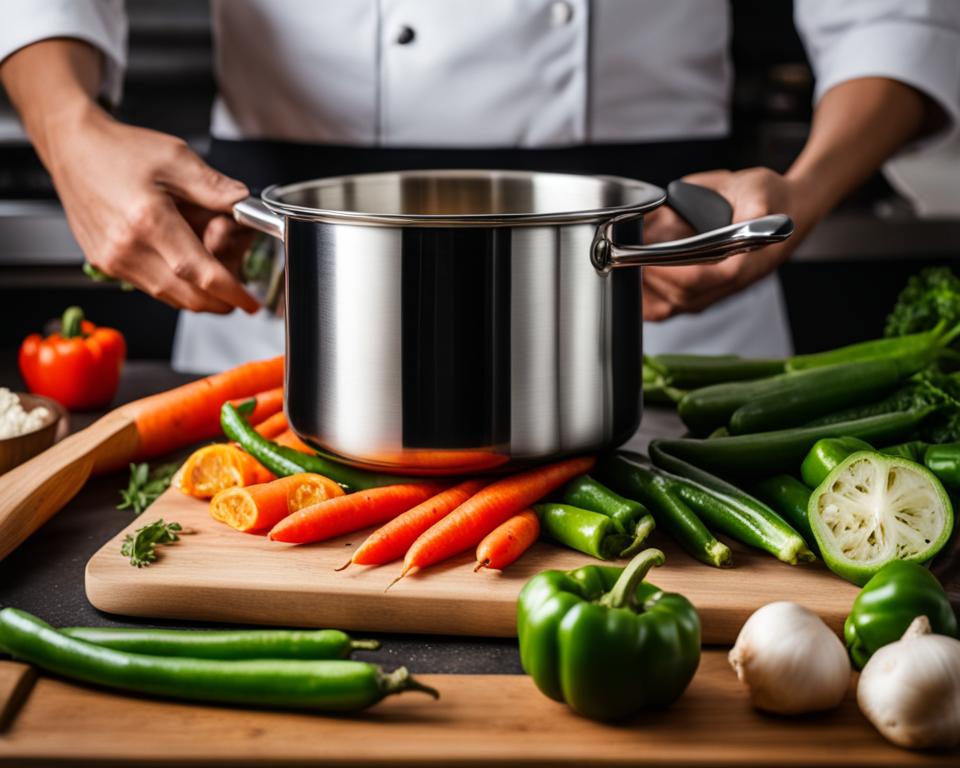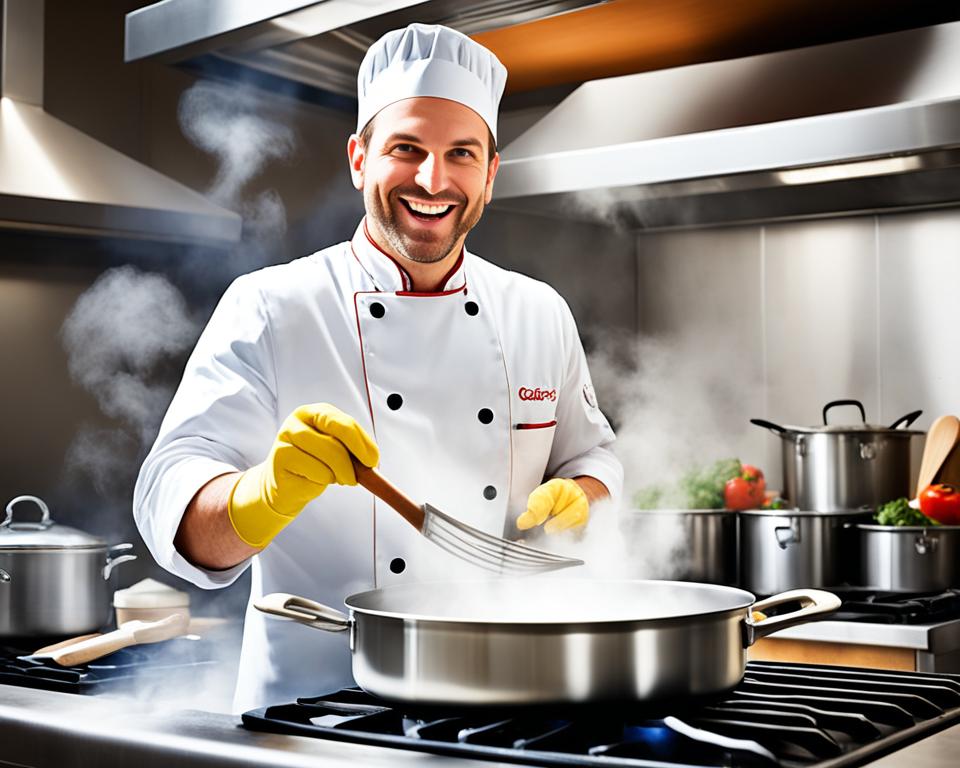Is Cast Aluminum Cookware Safe?
Cast aluminum cookware is a type of cookware that is made from a mixture of aluminum and other metals. It is known for its durability, heat conduction, and affordability. However, there is some debate over whether or not cast aluminum cookware is safe to use.
Some people believe that cast aluminum cookware can leach aluminum into food, which can lead to health problems. However, there is no scientific evidence to support this claim. In fact, a study by the National Institutes of Health found that cast aluminum cookware does not release any significant amount of aluminum into food.
Overall, cast aluminum cookware is considered to be safe to use. However, it is important to follow some safety precautions, such as:
- Do not use cast aluminum cookware on high heat.
- Do not use cast aluminum cookware to cook acidic foods, such as tomatoes or citrus fruits.
- Do not use cast aluminum cookware to cook salty foods.
- Do not use cast aluminum cookware to cook foods that contain a lot of sugar.
By following these precautions, you can help to ensure that your cast aluminum cookware is safe to use.
II. History of Cast Aluminum Cookware
Cast aluminum cookware has been around for centuries. The earliest known examples of cast aluminum cookware date back to the 18th century. However, it wasn’t until the early 20th century that cast aluminum cookware became widely available.
In the early 20th century, cast aluminum cookware was used primarily by professional chefs. However, as the price of cast aluminum cookware decreased, it became more affordable for home cooks. By the mid-20th century, cast aluminum cookware was a common kitchen staple in homes across the United States.
Today, cast aluminum cookware is still a popular choice for home cooks. It is affordable, durable, and heats evenly. Cast aluminum cookware is also versatile and can be used for a variety of cooking tasks.
Safety Concerns with Cast Aluminum Cookware
There are a few safety concerns associated with cast aluminum cookware. These include:
- Aluminum can leach into food when it is cooked in acidic foods, such as tomatoes, citrus fruits, and vinegar. This can lead to health problems, such as Alzheimer’s disease and anemia.
- Cast aluminum cookware can be scratched easily, which can create a potential for bacteria to grow.
- Cast aluminum cookware can be difficult to clean, which can also create a potential for bacteria to grow.
However, it is important to note that these safety concerns are only associated with the use of uncoated cast aluminum cookware. If you use a cast aluminum cookware that is coated with a non-stick surface, these safety concerns are greatly reduced.
IV. Safety Concerns with Cast Aluminum Cookware
While cast aluminum cookware is generally considered safe to use, there are some potential safety concerns that should be taken into consideration.
One concern is that cast aluminum cookware can leach aluminum into food. This is especially true if the cookware is scratched or damaged, as the aluminum can then come into direct contact with food. While the amount of aluminum that leaches into food is generally considered to be safe, some people may be concerned about the potential health effects of consuming aluminum.
Another concern is that cast aluminum cookware can become hot enough to cause burns. This is especially true if the cookware is used on high heat or if it is not properly seasoned.
Finally, cast aluminum cookware can react with acidic foods, such as tomatoes and citrus fruits. This can cause the cookware to discolor and may also release aluminum into the food.
Overall, cast aluminum cookware is generally considered safe to use, but there are some potential safety concerns that should be taken into consideration.
V. How to Safely Use Cast Aluminum Cookware
Cast aluminum cookware is generally safe to use, but there are a few things you can do to minimize the risk of any potential health risks.
First, avoid using cast aluminum cookware for acidic foods, such as tomatoes, citrus fruits, and vinegar. These foods can react with the aluminum in the cookware and leach aluminum into the food.
Second, do not use cast aluminum cookware on high heat. High heat can cause the aluminum to leach into food more quickly.
Third, avoid using cast aluminum cookware with nonstick coatings. The nonstick coating can break down over time and release chemicals into the food.
If you follow these tips, you can safely use cast aluminum cookware without any concerns.
VI. Cleaning Cast Aluminum Cookware
Cast aluminum cookware is relatively easy to clean, but there are a few things you should keep in mind.
First, avoid using harsh chemicals or abrasive cleaners, as these can damage the finish of the cookware. Instead, use a mild dish soap and warm water.
Second, be sure to rinse the cookware thoroughly after cleaning to remove any soap residue.
Third, dry the cookware immediately after washing to prevent it from rusting.
If you have any stubborn stains or grease buildup, you can soak the cookware in a solution of hot water and vinegar for a few hours.
You can also use a commercial cast aluminum cleaner to clean your cookware. However, be sure to follow the directions on the product label carefully.
By following these tips, you can keep your cast aluminum cookware clean and looking its best.
VII. Storing Cast Aluminum Cookware
Cast aluminum cookware can be stored in a variety of ways. Here are a few tips:
- Store cast aluminum cookware in a cool, dry place.
- Do not stack cast aluminum cookware with other cookware.
- Do not use abrasive cleaners or scouring pads on cast aluminum cookware.
- Do not use harsh chemicals on cast aluminum cookware.
By following these tips, you can help to extend the life of your cast aluminum cookware.Common Problems with Cast Aluminum Cookware
VIII. Common Problems with Cast Aluminum Cookware
While cast aluminum cookware is generally safe to use, there are a few potential problems that you may encounter. These include:
-
The cookware can become scratched or damaged if it is not properly cared for.
-
The cookware can react with acidic foods, causing them to taste metallic.
-
The cookware can become discolored or stained over time.
To avoid these problems, it is important to follow the care and cleaning instructions that come with your cookware. You should also avoid using acidic foods in cast aluminum cookware, and you should clean the cookware thoroughly after each use.
IX. Cast Aluminum Cookware Alternatives
If you are concerned about the safety of cast aluminum cookware, there are a number of alternative materials that you can use. Some of the most popular alternatives include stainless steel, ceramic, and nonstick cookware.
Stainless steel is a durable and corrosion-resistant material that is perfect for everyday cooking. It is also relatively non-stick, making it easy to clean. However, stainless steel cookware can be more expensive than cast aluminum cookware.
Ceramic cookware is made from a combination of clay and minerals, and it is known for its excellent heat distribution and retention. Ceramic cookware is also non-stick and easy to clean. However, it can be more fragile than stainless steel or cast aluminum cookware.
Nonstick cookware is coated with a chemical called Teflon, which makes it easy to clean and prevents food from sticking. However, Teflon can be harmful if it is heated to high temperatures, so it is important to follow the manufacturer’s instructions for use.
Ultimately, the best cookware alternative for you will depend on your individual needs and preferences. If you are looking for a durable, non-stick option that is easy to clean, stainless steel or ceramic cookware may be a good choice. If you are concerned about the safety of Teflon, you may want to choose a nonstick cookware that is made with a different coating.


